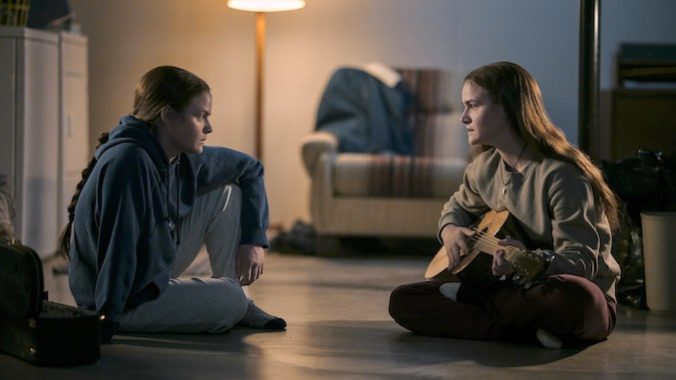Freevee’s High School Is Intimate, Grungy, and Much More Than a Tegan and Sara Biopic
Photo Courtesy of Freevee
If you are a sapphic woman (or a frequent viewer of Greys Anatomy), then you have more than likely heard Tegan and Sara’s music. The band, comprised of twin sisters Tegan and Sara Quin, are known for being trailblazers for LGBTQ artists within the music industry and the alternative genre. Before that, though, they were a pair of young, queer sisters just trying to survive their teenage years, which is the story being brought to the screen in Freevee’s High School.
Based on their bestselling memoir of the same name, High School follows Canadian musicians Tegan and Sara (who act as Executive Producers on the project) as they navigate sexuality, sisterhood, and music, telling the story that came before the Platinum albums and sold-out tours. Unlike most biopics, which oftentimes forgo the humble origins to speed straight into the musicians’ success story, High School has an unabashedly limited scope, lingering on the subtle emotions and overwhelming loneliness that colored Tegan and Sara’s real high school experiences. But it’s not just High School: The Tegan and Sara Story, it’s much more than that.
Helmed by co-showrunners Laura Kittrell and Clea DuVall—the latter of whom also steps in to direct 6 out of 8 episodes, all of which were available for review—High School stars TikTok creators and TV newcomers Railey and Seazynn Gilliland as Tegan and Sara, respectively. If you hear the words “TikTok actor” and shudder, you’re not alone, and while the Gillilands’ performances aren’t groundbreaking by any means, they still manage to hold their own against heavy hitters like co-star Cobie Smulders, who plays their mother Simone. In the first few episodes, it’s clear that the twins are still getting accustomed to working in front of this kind of camera, but as the series progresses, their performances improve as they relax into the characters. DuVall’s forgiving direction and intimate approach allows that discomfort to even read as just teenage angst, casting a wide safety net of support for its leading newcomers.
Intimacy is where this show shines, as it allows for extremely introspective looks at these characters, showcased across what almost act as 15-minute vignettes within the series’ half-hour episodes, which are split into two different points of view. Following in the footsteps of their memoir, which featured alternating chapters written by Tegan and Sara, the series does the same, while also roping in other perspectives like that of their mother or their friends. These other perspectives, especially Simone’s subplot, fill out the series, creating a tangible world around the twins.
-

-

-

-

-

-

-

-

-

-

-

-

-

-

-

-

-

-

-

-

-

-

-

-

-

-

-

-

-

-

-

-

-

-

-

-

-

-

-

-








































